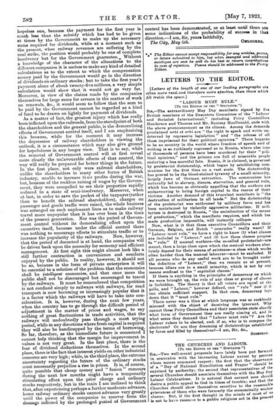LETTERS TO THE EDITOR.
[Letters of the length of one of our leading paragraphs are often more read,and therefore more effective, than those which fill treble the space.]
"LABOUR MUST RULE."
(To THE EDITOR OF THE " SPECTATOR.")
Sia,—The extraordinary May Day manifesto signed by five British members of the Executive Committee of the " Labour and Socialist International," including Privy Councillors Henderson and Thomas and Mr. Ramsay MacDonald, ends with the above pronouncement as its climax. Among the demands proclaimed urbi et orbi are " the right to speak and write un- deterred by repressive legislation " and " the release of all those imprisoned for their political opinions." There happens to be no country in the world where freedom of speech and of writing is eo ruthlessly repressed as in Russia, where also tens of thousands of pereone have been murdered for their " poli- tical opinions," and the prisons are full of miserable people enduring a less merciful fate. Russia, it is claimed, is governed by proletariat dictatorship, which began by establishing com- munism for the first time on a vast scale. The dictatorship has proved to be the blood-stained tyranny of a small minority, largely Jews of German extraction. The communism has naturally led to slavery, disease, starvation, and general ruin, which has become so obviously appalling that the authors are endeavouring to bring foreign capital to the rescue of their victims. Another demand of this truculent manifesto is " the destruction of militarism in all lands." But the dictatorship of the proletariat was enthroned by military force and has been maintained by violently aggressive militarism. If mili- tarism is destroyed in Russia, " the socialisation of the means of production," which the manifesto requires, and which has made production impossible, will instantly collapse.
Now, what is it that these executive Councillors and their German, Belgian, and Dutch " comrades " really want? If "Labour must rule," we have a right to know (1) what classes are included in "Labour," and (2) how these classes propose to " rule." If manual workers—the so-called proletariat—are meant, then a large class upon which the manual workers abso- lutely depend for their means of existence—a class which works often harder than the manual labourer—must be excluded. If all persons who do any useful work are to be brought under the definition of "Labour," then we remain as at present, because idlers are in a small minority, which is not by any means confined to the " capitalist classes."
If there is anything in the principles of democracy on which we were brought up, the rule of any class or group of classes is forbidden. The theory is that all voters are equal at the polls, and "Labour," however defined, can " rule " now if it can obtain sufficient support. In that case, democracy lays down that it "must rule."
There never was a time at which language was so recklessly misused with the object of deceiving the ignorant. Why cannot these Privy Councillors and their associates state clearly what form of Government they are really aiming at, and in what sense they demand that " Labour must rule"? Are the Labour rulers to be elected, and, if so, who is to compose the electorate? Or are they dreaming of dictatorships established by force and filled by themselves?—I am, Sir, &c.,
SYDIDTILAM.


































 Previous page
Previous page